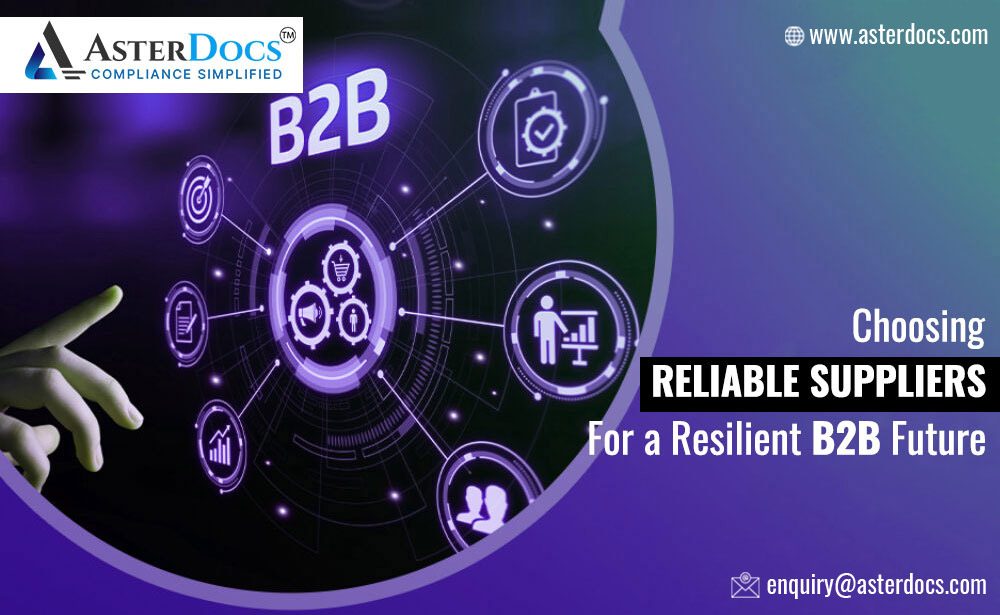In the intricate dance of B2B transactions, the reliability of your suppliers is the backbone of a smooth and successful supply chain. Choosing the right partners can significantly impact your business’s efficiency, reputation, and, ultimately, its bottom line. This blog aims to guide companies through the crucial process of evaluating and selecting reliable suppliers, shedding light on critical criteria, risk assessment, and best practices to ensure a dependable supply chain.
Understanding the Importance of Supplier Reliability
Reliability is more than just delivering products on time. It encompasses consistency, transparency, and consistently meeting quality standards. A reliable supplier is a strategic partner invested in your success, contributing to the overall stability and growth of your B2B business.
Critical Criteria for Evaluating Suppliers
Consistency in Product Quality:
- Assess the supplier’s track record in maintaining consistent product quality. Look for certifications and adherence to industry standards that reflect a commitment to delivering reliable goods.
On-Time Delivery Performance:
- Timely delivery is crucial for maintaining production schedules. Evaluate a supplier’s historical on-time delivery performance to gauge their reliability in meeting deadlines.
Communication and Responsiveness:
- A reliable supplier communicates openly and responds promptly to inquiries. Evaluate their responsiveness and transparency in addressing concerns or providing updates.
Financial Stability:
- Financial stability is indicative of a supplier’s ability to weather economic fluctuations. Conduct a financial assessment to ensure your chosen supplier is financially sound and capable of sustaining long-term partnerships.
Risk Assessment in Supplier Selection
Supplier Location and Logistics:
- Assess the geographic location of your business’s supplier. Consider logistics and potential transportation challenges that may impact the reliability of deliveries.
Diversification of Suppliers:
- Relying on a single supplier poses risks in case of disruptions. Consider diversifying your supplier base to mitigate risks associated with unforeseen events affecting a particular supplier.
Supply Chain Transparency:
- Transparency in the supplier’s supply chain is critical. A clear understanding of their sourcing practices and potential vulnerabilities in the supply chain helps anticipate and address issues proactively.
Best Practices for Choosing Reliable Suppliers:
Thorough Supplier Audits:
- Conduct thorough audits before finalizing partnerships. Site visits, quality control assessments, and interviews can provide valuable insights into a supplier’s capabilities and reliability.
Long-Term Relationship Focus:
- Prioritize suppliers willing to build long-term relationships. These partners are more likely to invest in quality, innovation, and collaborative problem-solving, ensuring a stable and evolving partnership.
Flexible and Scalable Capacity:
- A reliable supplier should have the capacity to scale with your business. Assess their flexibility in adapting to changing demand and their ability to meet increasing order volumes.
Choose with Confidence: AsterDocs Revolutionizes Supplier Qualification
AsterDocs stands at the forefront of revolutionizing supplier qualification in the B2B landscape. This software streamlines communication, enhances data exchange, and provides a robust framework for risk assessment and supplier qualification. Businesses leveraging AsterDocs optimize supplier relationships, confidently navigate B2B complexities, and foster resilience in their supply chains, especially in the nutraceutical ingredients suppliers.
Key Features:
- Transparent Communication
- Risk Assessment
- Supplier and Ingredients Document Management
- Supplier Management
- Customer Management
AsterDocs is not just a game-changer; it’s a comprehensive solution for supplier qualification. Its effectiveness in risk analysis, transparent communication, and user-defined categorization empowers businesses to build and fortify supplier relationships in today’s dynamic market. Additionally, the software simplifies storing, sharing, and managing supplier and ingredient documents, ensuring ease and efficiency.
Conclusion
In the dynamic landscape of B2B transactions, supplier reliability is the cornerstone of a successful and resilient supply chain. Businesses can make informed decisions in selecting reliable suppliers by meticulously evaluating critical criteria, conducting risk assessments, and implementing best practices. The journey toward a dependable supply chain begins with strategic partner choices, laying the foundation for sustainable growth, customer satisfaction, and overall business success.














